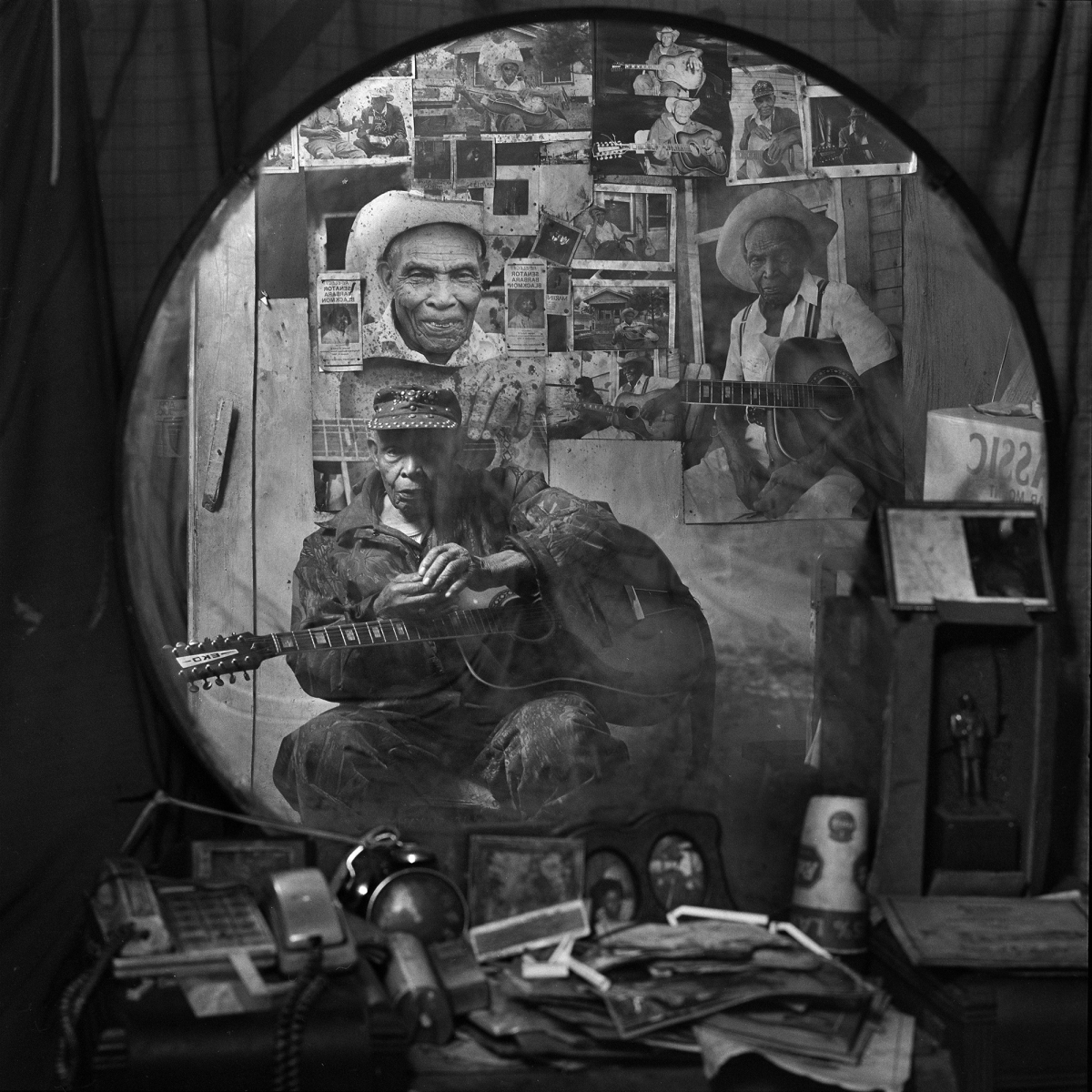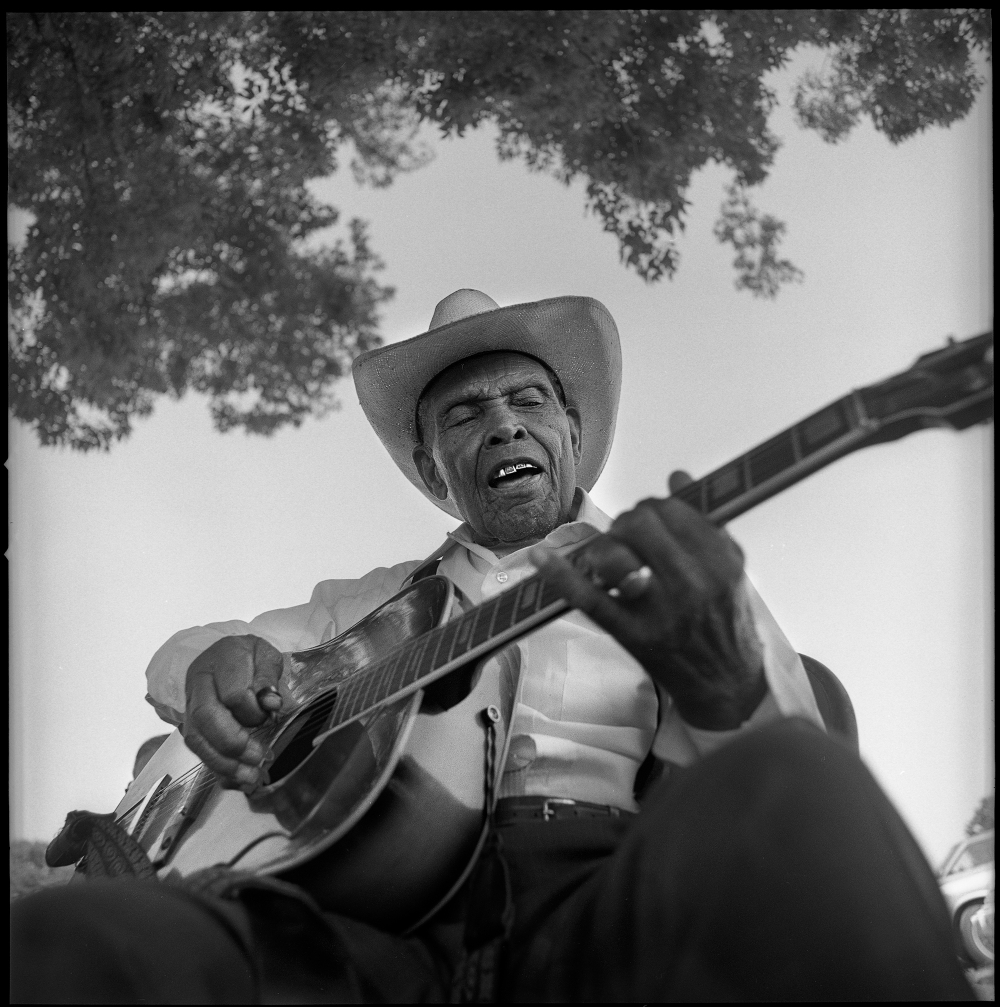Jack Owens (1904-1997) was a practitioner of the distinctive “Bentonia school” of blues, named after the small town in the hills of Yazoo County just southeast of the Delta. The style, often described as “eerie,” is most closely associated with the early 1930s recordings of Nehemiah “Skip” James (1902-1969), who was introduced to an international audience during the “blues revival” of the 1960s. Owens, as well as a handful of other artists, demonstrated that James’ sound was indicative of a shared tradition, and Owens was awarded a National Heritage Fellowship in 1993.
Owens was born in Bentonia and began learning to play guitar as a small child. He was inspired by his family members, including his grandfather and uncle. He taught himself to play the blues, worked as a sharecropper and for many years ran a “juke house” in his home or at an adjacent building where he and his wife, Mabel, sold pork and goat barbecue sandwiches and bootleg liquor. The juke was open Friday through Sunday and featured a juke box and live music by Owens and his longtime partner, harmonica player Benjamin “Bud” Spires (1931-2014).
The Bentonia style is thought to have originated with Henry Stuckey (1897–1966), who never recorded. Ethnomusicologist Dr. David Evans, who made Owens’ first recordings in 1966 and documented others in the local tradition, described the style as “haunting, brooding lyrics dealing with such themes as loneliness, death and the supernatural . . . Altogether it is one of the eeriest, loneliest and deepest blues sounds ever recorded.”

Above (main image): Jack Owens photographed in Greenwood, MS by Bill Steber; Right: Jack Owens photographed by Bill Steber
Owens’ repertoire included dark-themed songs associated with Skip James, notably “It Must Have Been the Devil” and “Hard Time Killing Floor Blues.” But he also regularly played songs from outside the tradition while entertaining patrons at his juke and at local parties. In addition to Delta standards like “Catfish Blues,” Owens also played songs he likely learned from records by artists including the Mississippi Sheiks, B.B. King, Robert Lockwood, Tampa Red, and Bumble Bee Slim.
Evans’ recordings of Owens first appeared on a compilation in 1968, and in 1971, Testament Records issued the album It Must Have Been the Devil: Mississippi Country Blues by Jack Owens & Bud Spires. Owens gained broader attention in 1978 when he appeared in the documentary The Land Where Blues Began, shot by Alan Lomax with Worth Long and John Bishop, and via his performances in Robert Mugge’s 1991 documentary Deep Blues. During these years, Owens became a local celebrity, visited often by blues fans, and he was featured in a Levi’s 501 Blues TV commercial. Although reluctant to travel his whole life, he began attending festivals outside the state in 1988 and later performed in the Netherlands, Switzerland, and Italy.
“Jack said he made more money sitting on his front porch playing his guitar than he made in a lifetime working in a cottonfield.”
Owens’ increased exposure inadvertently led to an expansion of the distinctive Bentonia tradition. Jimmy “Duck” Holmes (b. 1947), proprietor of the juke joint Blue Front Cafe in Bentonia, began studying Owens’ music more actively after seeing all the attention focused on Owens. “Within maybe a ten-year span,” Holmes told Jim O’Neal, “Jack said he made more money sitting on his front porch playing his guitar than he made in a lifetime working in a cottonfield.” Holmes would subsequently record multiple albums, receiving a Grammy nomination for his 2020 album Cypress Grove (Easy Eye Sound), and become a spokesperson for the local music tradition.
During his last decade Owens continued to perform at local festivals and for visitors to his home, many of whom paid for lessons and/or performances. A Mississippi Blues Trail marker was later dedicated at the site of Owens’ home, joining two other markers in Bentonia--whose current population is less than five hundred--for Skip James and the Blue Front Cafe. Owens’ legacy also continues to grow with the popularity of the annual Bentonia Blues Festival, which celebrates the distinctive Bentonia style. Many performers at the event play songs that they learned from his recordings; as of March, 2022 over 100,000 people had watched a Youtube video of him from 1978.
To learn more about the National Endowment for the Arts (NEA) or to nominate a Mississippi traditional artist for a NEA National Heritage Fellowship, please visit their website.
Resources
David Evans, liner notes to It Must Have Been the Devil: Mississippi Country Blues by Jack Owens & Bud Spires, Testament Records, 1971
Jim O’Neal, “Jack Owens: A Remembrance,” pp. 30-37, Living Blues #137, Jan./Feb. 1998

